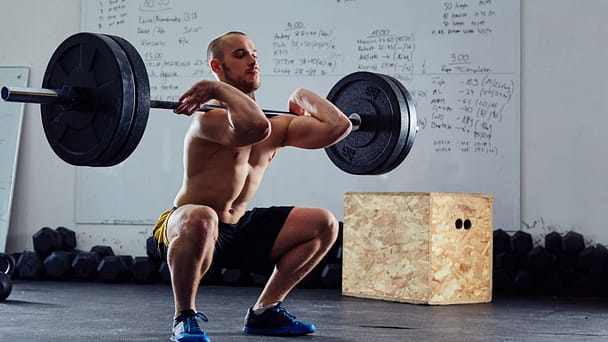Hey there fitness enthusiasts! If you’ve ever wondered whether you should make a pit stop at the restroom before hitting those squat racks, or if timing your pre-workout meal really makes a difference, you’re in the right place.
In this blog post, we’re diving into the nitty-gritty of why these seemingly mundane details can have a big impact on your squatting game.
Whether you’re a seasoned gym-goer or just starting out, read on to discover how a little pre-squat strategy can lead to a smoother, more effective workout.”
Understanding if it is a good idea to poop before squats.
Especially if you feel the need to do so. Yes, it can be a good idea to have a bowel movement before doing squats,
Here’s why:
Comfort: Going to the bathroom before your workout can help you feel more comfortable during your squats.
It can be distracting and uncomfortable to have the urge to poop while you’re trying to focus on your exercise routine.
Core Stability: Squats engage your core muscles, and having a full bowel can potentially affect your core stability.
Emptying your bowels can help you maintain proper form and balance during squats.
Hydration: Staying hydrated is essential for a successful workout, but drinking too much water right before squats can also lead to an urgent need to use the restroom.
It’s a good idea to balance your fluid intake to avoid this situation.
Timing: It’s important to time your pre-workout meal appropriately. Eating a large, heavy meal right before squats can lead to discomfort and potential gastrointestinal issues.
Having a bowel movement before your workout can help you feel more prepared and comfortable.
In other words, if you feel the need to poop before doing squats, it’s generally a good idea to use the restroom to ensure you can focus on your exercise routine without distractions or discomfort. However, individual preferences and digestive patterns can vary, so do what feels best for your body.

Further explanations
Let’s dive deeper and explain further the point mentioned here.
Let me explain further why going to the bathroom before your workout can contribute to a more comfortable squatting experience:
Comfort.
Reduced Distractions:
When you’re in the middle of a workout, particularly a compound exercise like squats that require concentration and balance, any bodily discomfort or distractions can hinder your performance.
If you have the urge to poop, it can be mentally distracting, making it challenging to focus on your form, breathing, and lifting technique.
Physical Discomfort:
Holding in a bowel movement while performing squats can lead to physical discomfort.
The muscles and pressure involved in squatting may exacerbate the feeling of needing to go, making your workout less enjoyable and more challenging to complete with proper technique.
Potential Gastrointestinal Discomfort:
Squats engage your core muscles significantly, and this includes the muscles surrounding your abdominal area.
If you have a full or unsettled stomach, it can lead to gastrointestinal discomfort, including gas, bloating, or cramping, during your squats.
Risk of Accidents:
While it may sound a bit embarrassing, it’s a practical concern. If you ignore the urge to poop and proceed with squats, you run the risk of experiencing an accident, which could be highly uncomfortable and embarrassing.
By taking a moment to use the restroom before your workout, you can eliminate these potential distractions and discomforts, allowing you to fully focus on your exercise routine.
It’s about creating the most conducive environment for a successful and productive workout session while also minimizing any potential physical or mental discomforts that could arise from holding in a bowel movement during your squats.
Core Stability.
Let’s explore further how having a full bowel can potentially affect your core stability during squats, and why emptying your bowels can help maintain proper form and balance:

Core Engagement:
Squats are a compound exercise that heavily relies on core engagement for stability and balance.
When you perform a squat, your core muscles, including the rectus abdominis, transverse abdominis, and obliques, play a crucial role in supporting your spine, maintaining an upright posture, and preventing your lower back from rounding or arching excessively.
Full Bowel Pressure:
When your bowel is full, it can create pressure in your abdominal cavity. This pressure can push against your core muscles, making it more challenging to engage them effectively during squats.
In some cases, this pressure can lead to a feeling of instability or discomfort in your midsection, which may affect your ability to maintain proper form.

Balance and Posture:
Maintaining balance during squats is essential to prevent injury. Your core muscles help you maintain an upright position, preventing your body from leaning too far forward or backward.
If you have a full bowel and increased pressure in your abdomen, it can throw off your balance, potentially causing you to lean forward or backward more than you should, which can increase the risk of injury.
Proper Breathing:
Core stability is closely linked to proper breathing techniques during squats. When your core is engaged and stable, it provides a solid base for efficient breathing.
A full bowel can interfere with your ability to take deep breaths and brace your core properly, affecting your overall stability and performance.
Risk of Straining:
If you attempt to perform squats with a full bowel and inadequate core engagement, you may inadvertently strain your lower back or other muscle groups as your body compensates for the lack of stability. This can lead to discomfort or injury over time.
Emptying your bowels before squats can help alleviate the pressure on your core muscles and create a more stable foundation for the exercise.
This, in turn, allows you to maintain proper form, balance, and posture, reducing the risk of injury and helping you get the most out of your squatting routine.
A concise tabular on this topic here.
Here’s a tabular comparison of the benefits of trying to have a bowel movement before squats:
| Benefits of Trying to Poop Before Squats | Explanation |
|---|---|
| Improved Comfort | Having an empty bowel can reduce the urge to poop during squats, enhancing overall comfort and focus during the exercise. |
| Enhanced Core Stability | An empty bowel minimizes pressure on core muscles, allowing for better engagement and stability during squats. |
| Better Balance and Posture | Reduced abdominal pressure leads to improved balance and posture during squats, reducing the risk of injury. |
| Proper Breathing | An empty bowel supports proper breathing techniques, crucial for maintaining core stability and overall form. |
| Lower Risk of Straining | Avoiding the strain caused by holding in a bowel movement can reduce the risk of discomfort and potential injury. |
| Enhanced Focus | Fewer distractions from bodily discomfort lead to better focus on lifting technique and achieving fitness goals. |
In summary, trying to have a bowel movement before squats offers several benefits, including improved comfort, core stability, balance, posture, breathing, and a lower risk of straining. These advantages collectively contribute to a more effective and safer squatting experience.
Hydration.
Balancing your fluid intake before squats is important for a successful workout, and it’s essential to understand why drinking too much water right before your exercise routine can lead to an urgent need to use the restroom:
Hydration is Vital:
Staying hydrated is crucial for maintaining overall health and optimizing exercise performance.
Dehydration can lead to decreased energy levels, muscle cramps, and reduced exercise capacity.
Therefore, it’s important to be adequately hydrated throughout the day, including before your workout.
Urgent Need to Use the Restroom:
The body’s natural response to excess fluid in the digestive system is to eliminate it, primarily through urination and bowel movements.
This is why drinking too much water right before your workout can trigger an urgent need to use the restroom. This sensation can be distracting and disruptive to your workout routine, including squats.
Discomfort and Distraction:
The discomfort of a full bladder or the urge to have a bowel movement can be distracting and interfere with your focus during squats.
It may also disrupt your breathing and core engagement, both of which are crucial for maintaining proper form and lifting safely.
To avoid the inconvenience of an urgent restroom trip during your workout, it’s advisable to hydrate consistently throughout the day rather than gulping down large amounts of water right before exercise.
Aim to maintain a balanced level of hydration by drinking fluids steadily in the hours leading up to your workout.
This approach helps ensure that you’re adequately hydrated without overloading your digestive system with excess fluids just before squats, allowing you to exercise comfortably and with full concentration.
Timing:
The timing of your pre-workout meal is indeed crucial for a successful squatting session, and it’s important to understand why eating a large, heavy meal right before squats can lead to discomfort and potential gastrointestinal issues:
Digestive Process:
When you eat a meal, your body begins the process of digestion. Food moves from your stomach to your small intestine, where it gets broken down and absorbed into your bloodstream. This process takes time, and the rate at which food is digested can vary based on the composition of the meal.
Blood Flow Redistribution:
During exercise, your body redirects blood flow away from your digestive system and towards your muscles to provide oxygen and nutrients needed for physical activity. This is known as the “fight or flight” response.
When you eat a large, heavy meal just before squats, your body may still be in the early stages of digestion, and the sudden diversion of blood flow away from the digestive tract can lead to discomfort, bloating, and potential gastrointestinal issues.
Discomfort and Distraction:
Digestive discomfort, such as bloating, cramping, or indigestion, can be distracting during squats. It can affect your ability to focus on your form, breathing, and the quality of your lifts.
This distraction can decrease the effectiveness of your workout and increase the risk of injury due to improper technique.
Potential for Gastrointestinal Issues:
Eating a large, heavy meal right before squats may increase the risk of more serious gastrointestinal issues, such as acid reflux or gastric distress.
These issues can be not only uncomfortable but also potentially harmful to your health.
To avoid these problems, it’s advisable to time your pre-workout meal appropriately:
Meal Timing:
Ideally, aim to eat a balanced meal containing carbohydrates, protein, and a moderate amount of healthy fats about 1 to 2 hours before your workout.
This allows sufficient time for digestion and reduces the likelihood of digestive discomfort during squats.
Light Snack Option:
If you’re exercising within 30 minutes to an hour, opt for a lighter snack like a banana or a small serving of yogurt to provide energy without overloading your digestive system.
Hydration:
Make sure to hydrate adequately before your workout, but avoid excessive fluid intake immediately before squats to prevent a full bladder and the need for restroom breaks.
By following these guidelines and allowing your body adequate time to digest your pre-workout meal, you can minimize digestive discomfort, feel more prepared, and maintain your comfort and focus during your squatting routine.
A concise tabular on this here.
Here’s a concise tabular summary of the key points regarding the importance of timing your pre-workout meal and considering the need for a bowel movement before squats:
| Aspect | Explanation |
|---|---|
| Digestive Process | Eating a large meal before squats can disrupt the digestive process, leading to discomfort. |
| Blood Flow Redistribution | Exercise redirects blood flow away from the digestive system, potentially causing bloating and discomfort during squats. |
| Discomfort and Distraction | Digestive discomfort can distract from proper form and focus, reducing the effectiveness of the workout. |
| Potential for Gastrointestinal Issues | Heavy meals before squats may increase the risk of serious gastrointestinal problems. |
| Meal Timing | Aim for a balanced meal 1-2 hours before squats for proper digestion and reduced discomfort. |
| Light Snack Option | Choose a lighter snack if the workout is within 30 minutes to an hour to provide energy without overloading digestion. |
| Hydration | Stay adequately hydrated but avoid excessive fluid intake right before squats to prevent an urgent need for the restroom. |
This concise table summarizes the importance of timing your pre-workout meal and considerations related to bowel movements for a comfortable and effective squatting routine.
Conclusion.
In conclusion, proper timing of your pre-workout meal and considering the need for a bowel movement before squats are essential factors in ensuring a comfortable and effective squatting routine.
Avoiding heavy meals immediately before exercise, allowing for adequate digestion time, and staying hydrated in moderation can contribute to a more focused, discomfort-free workout experience.
These considerations help maintain proper form, maximize performance, and reduce the risk of gastrointestinal issues during squats, ultimately promoting a safer and more productive exercise session.

Hey there, it’s Mike Rrsq, the Editor-in-Chief over at Jsquat.com, and I’m absolutely obsessed with all things squat fitness! I’ve been lucky enough to get some serious recognition for my work in this field. With a solid background in the fitness and wellness industry, I’ve been there right from the get-go, helping shape this website into what it is today.
You see, I’m not just the boss around here; I’m also a passionate contributor. I love sharing my insights through my articles, and trust me, they’re not your run-of-the-mill stuff. Each piece I write is a labor of love, filled with my expertise and real-world experience in the fitness universe. So, if you’re into fitness and looking for some inspiration, you’re in the right place!


